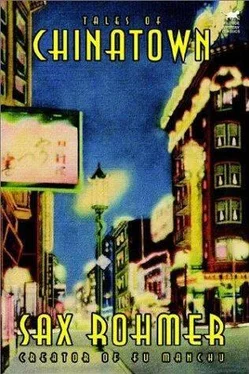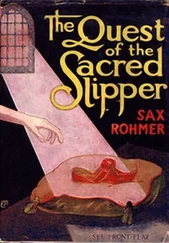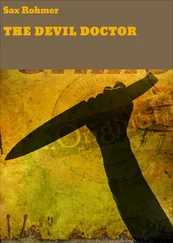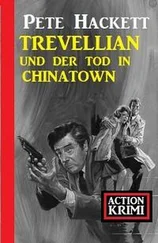"The window of the tragedy, Knox," explained Harley.
He crossed the room.
"If you will stand here beside me you will see the gap in the railing caused by the breaking away of the fragment which now lies on Mr. Meyer's desk. Some few yards to the left in the street below is where the assault took place, of which we have heard, and the unfortunate Mr. De Lana, who was dining here alone-an eccentric custom of his-naturally ran to the window upon hearing the disturbance and leaned out, supporting his weight upon the railing. The rail collapsed, and-we know the rest."
"It will ruin me," groaned Meyer; "it will give bad repute to my establishment."
"I fear it will," agreed Harley sympathetically, "unless we can manage to clear up one or two little difficulties which I have observed. For instance"-he tapped the proprietor on the shoulder confidentially -"have you any idea, any hazy idea, of the identity of the woman who was dining here with Mr. De Lana on Wednesday night?"
The effect of this simple inquiry upon the proprietor was phenomenal. His fat yellow face assumed a sort of leaden hue, and his already prominent eyes protruded abnormally. He licked his lips.
"I tell you-already I tell you," he muttered, "that Mr. De Lana he engage this room every Wednesday and sometimes also Friday, and dine here by himself."
"And I tell you," said Harley sweetly, "that you are an inspired liar. You smuggled her out by the side entrance after the accident."
"The side entrance?" muttered Meyer. "The side entrance?"
"Exactly; the side entrance. There is something else which I must ask you to tell me. Who had engaged this room on Tuesday night, the night before the accident?"
The proprietor's expression remained uncomprehending, and:
"A gentleman," he said. "I never see him before."
"Another solitary diner?" suggested Harley.
"Yes, he is alone all the evening waiting for a friend who does not arrive."
"Ah," mused Harley-"alone all the evening, was he? And his friend disappointed him. May I suggest that he was a dark man? Gray at the temples, having a dark beard and moustache, and a very tanned face? His eyes slanted slightly upward?"
"Yes! yes!" cried Meyer, and his astonishment was patently unfeigned. "It is a friend of yours?"
"A friend of mine, yes," said Harley absently, but his expression was very grim. "What time did he finally leave?"
"He waited until after eleven o'clock. The dinner is spoilt. He pays, but does not complain."
"No," said Harley musingly, "he had nothing to complain about. One more question, my friend. When the lady escaped hurriedly on Wednesday night, what was it that she left behind and what price are you trying to extort from her for returning it?"
At that the man collapsed entirely.
"Ah, Gott!" he cried, and raised his hand to his clammy forehead. "You will ruin me. I am a ruined man. I don't try to extort anything. I run an honest business--"
"And one of the most profitable in the world," added Harley, "since the days of Thais to our own. Even at Bond Street rentals I assume that a house of assignation is a golden enterprise."
"Ah!" groaned Meyer, "I am ruined, so what does it matter? I tell you everything. I know Mr. De Lana who engages my room regularly, but I don't know who the lady is who meets him here. No! I swear it! But always it is the same lady. When he falls I am downstairs in my office, and I hear him cry out. The lady comes running from the room and begs of me to get her away without being seen and to keep all mention of her out of the matter."
"What did she pay you?" asked Harley.
"Pay me?" muttered Meyer, pulled up thus shortly in the midst of his statement.
"Pay you. Exactly. Don't argue; answer."
The man delivered himself of a guttural, choking sound, and finally:
"She promised one hundred pounds," he confessed hoarsely.
"But you surely did not accept a mere promise? Out with it. What did she give you?"
"A ring," came the confession at last.
"A ring. I see. I will take it with me if you don't mind. And now, finally, what was it that she left behind?"
"Ah, Gott!" moaned the man, dropping into a chair and resting his arms upon the table. "It is all a great panic, you see. I hurry her out by the back stair from this landing and she forgets her bag."
"Her bag? Good."
"Then I clear away the remains of dinner so I can say Mr. De Lana is dining alone. It is as much my interest as the lady's."
"Of course! I quite understand. I will trouble you no more, Mr. Meyer, except to step into your office and to relieve you of that incriminating evidence, the lady's bag and her ring."
Do you understand, Knox?" said Harley as the cab bore us toward Hamilton Place. "Do you grasp the details of this cunning scheme?"
"On the contrary," I replied, "I am hopelessly at sea."
Nevertheless, I had forgotten that I was hungry in the excitement which now claimed me. For although the thread upon which these seemingly disconnected things hung was invisible to me, I recognized that Bampton, the city clerk, the bearded stranger who had made so singular a proposition to him, the white-hatted major, the dead stockbroker, and the mysterious woman whose presence in the case the clear sight of Harley had promptly detected, all were linked together by some subtle chain. I was convinced, too, that my friend held at least one end of that chain in his grip.
"In order to prepare your mind for the interview which I hope to obtain this evening," continued Harley, "let me enlighten you upon one or two points which may seem obscure. In the first place you recognize that anyone leaning out of the window on the second floor would almost automatically rest his weight upon the iron bar which was placed there for that very purpose, since the ledge is unusually low?"
"Quite," I replied, "and it also follows that if the bar gave way anyone thus leaning on it would be pitched into the street."
"Your reasoning is correct."
"But, my dear fellow," said I, "how could such an accident have been foreseen?"
"You speak of an accident. This was no accident! One end of the bar had been filed completely through, although the file marks had been carefully concealed with rust and dirt; and the other end had been wrenched out from its socket and then replaced in such a way that anyone leaning upon the bar could not fail to be precipitated into the street!"
"Good heavens! Then you mean--"
"I mean, Knox, that the man who occupied the supper room on the night before the tragedy-the dark man, tanned and bearded, with slightly oblique eyes-spent his time in filing through that bar-in short, in preparing a death trap!"
I was almost dumbfounded.
"But, Harley," I said, "assuming that he knew his victim would be the next occupant of the room, how could he know--?"
I stopped. Suddenly, as if a curtain had been raised, the details of what I now perceived to be a fiendishly cunning murder were revealed to me.
"According to his own account, Knox," resumed Harley, "Major Ragstaff regularly passed along that street with military punctuality at the same hour every night. You may take it for granted that the murderer was well aware of this. As a matter of fact, I happen to know that he was. We must also take it for granted that the murderer knew of these little dinners for two which took place in the private room above the Cafe Dame every Wednesday-and sometimes on Friday. Around the figure of the methodical major-with his conspicuous white hat as a sort of focus-was built up one of the most ingenious schemes of murder with which I have ever come in contact. The victim literally killed himself."
"But, Harley, the victim might have ignored the disturbance."
"That is where I first detected the touch of genius, Knox. He recognized the voice of one of the combatants-or his companion did. Here we are."
Читать дальше












